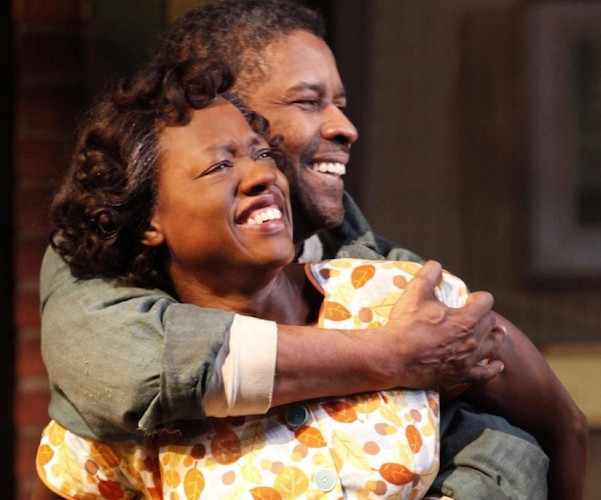Film Review: “Fences” — The Tragedy of Walls
This excellent film version of the play Fences meets (even exceeds) the considerable demands of August Wilson’s script.
Fences, directed by Denzel Washington. Screening at the Kendall Cinema and Loews theaters, in Cambridge, Somerville, and Boston.

Denzel Washington and Viola Davis in the film version of August Wilson’s “Fences.”
By Robert Israel
Can a film capture the essence of a theater text without losing something in translation? In the case of August Wilson’s play Fences, the answer is a resounding yes.
Denzel Washington directs and also stars as Troy Maxon, reprising his Tony award-winning performance. Viola Davis (who also won a Tony Award in the Broadway production) plays his his long-suffering wife, Rose. Fences will no doubt be an Oscar contender but, more important, the film is not content to pay homage to the original script (and screenplay) by Wilson, but improves on the source material by exploring the Maxon’s family dynamics while paying close attention to Wilson’s remarkable ear for poetic dialog.
But first, a bit of a backstory about the playwright and why this film – decades in the making – is such a significant achievement.
I met playwright August Wilson (1945-2005) in the late 1970s in St. Paul, Minnesota, and then during his repeated visits to Boston and New Haven. I was left with two prominent impressions: his belief in the importance of attaining excellence and his eidetic talent for capturing the lyricism of African-American speech. He credited his hunger for creating first-rate art to his mother. In his autobiographical play How I Learned What I Learned, the dramatist remembers growing up in hardscrabble Pittsburgh, where most of his 10 plays are set. At home, his mother bare-knuckled him into never settling for “second best.” The second proclivity emerged when he finally chose his métier—producing plays for the stage after years of writing poems and studying the speech patterns of black men and women he’d meet in bars, pool halls, community centers, and elsewhere. This examination gave brith to his array of indelible characters who, to quote a phrase from poet Langston Hughes, were stuck to the “sweet flypaper of life.”
As to why it took decades to produce a film version of Fences:
During his lifetime, several Hollywood producers dangled lucrative offers before Wilson to recast his plays into film scripts. He resisted. He preferred to work with his handpicked repertory theater companies – the Huntington Theatre Company in Boston among them – because they allowed him to engage in extensive rewrites (sometimes hours before curtain), thus respecting his obdurate pursuit of excellence. The second reason was because he insisted – the New York Times called it his “unwritten rule” – that his plays about black life be directed by African-Americans only. Consequently, he wrote only two screenplays. The first, a teleplay, was drawn from his Pulitzer Prize winning play, The Piano Lesson; it was produced and televised during his lifetime. The second screenplay, Fences (which also won a Pulitzer), was left incomplete and remained unproduced at the time of his death.
Enter actor Washington, who performed the role of Maxon on Broadway before tackling the task of turning Wilson’s screenplay into a film, where he stars alongside Davis. They shot the movie on location, in Wilson’s Pittsburgh.
The good news is that Washington and company have done Wilson proud. The film is riveting. It’s pace is unrelenting, unforgiving, and unsparing. It is a tale of patriarchal hubris, the downfall of an undeniably charismatic man, an entertaining yarn spinner with a powerful sexual appetite who bullies those around him, to the point that he believes that he can wrestle and win against the Grim Reaper. Washington’s powerful performance is matched by Viola Davis’. New England theatergoers who have long memories will remember her work onstage at Providence’s Trinity Rep and at Boston’s Huntington Theatre Company. Another member of the film’s cast who has performed onstage in Boston, Stephen McKinley Henderson, plays Bono, Troy’s co-worker and friend, superbly.
I have seen numerous productions of Fences – in New Haven during tryouts and on Broadway – I was relieved to see how this film meets (even exceeds) the considerable demands of Wilson’s script, which, for all its honest condemnations of human weakness, is very much about a troubled world where temptations and unfairness are rampant, and where society is arranged so that only a small number of us have an opportunity to realize their potential. It is a valuable reminder of injustice at a time that is dedicated to erecting walls and building fences.
Robert Israel writes about theater, travel, and the arts, and is a member of Independent Reviewers of New England (IRNE). He can be reached at risrael_97@yahoo.com.
